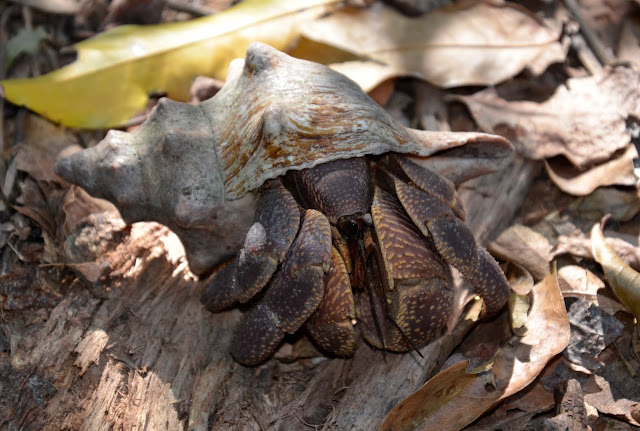Stone Town, Zanzibar and the Fish and Crab Safari on Chumbe Island
October 10-15l
 |
| Dhow Boat Zanzibar |
 |
| Zanzabar |

We take another small Cessna plane to Dar Es Salaam and then on to Stone Town in Zanzibar. In Stone Town we stay at the Hotel Serena the first night and then at the Tembo Hotel. Both these rather Arabic-Colonial style hotels have mosquito nets over the beds and balconies that overlook the beach.
We spend time decompressing our safari adventures by watching the busy water boat activity and sauntering around the labyrinth of alleys in Stone Town. Bartering is expected but the
sellers are not aggressive or pushy. Marie and I talk with two women shop keepers about their lives and the fact their husbands have two wives. Not sure about the two wives idea..and definitely not two husbands. We do agree on the idea of promoting peace in the world, supporting women and we buy a few trinkets.
Later in the market I buy some baskets and fabric but am not
sure what I will do with these. Marie gets some beautiful wooden bowls.
 John gives
me a birthday present that is a doll made by the Mangali Tribe pre WW II in
Northern Tanzania. I am delighted with this doll which symbolizes “protection”.
Perhaps it will help me with my directional challenges.
John gives
me a birthday present that is a doll made by the Mangali Tribe pre WW II in
Northern Tanzania. I am delighted with this doll which symbolizes “protection”.
Perhaps it will help me with my directional challenges.
Actually it is a bit of a shock after the
safari to be back to busy streets, sales pitches and the internet. We start
talking about politics again and meet two British hotel business men in the pool and compare
notes about Brexit and Trump events.
I believe we all find the fish and meat
market more interesting and therapeutic than the tourist areas, especially after
getting a brief rundown on the US news disasters. John and Marie bargain for
spices which seems fitting since Zanzibar is famous for its spice trade while
infamous for its slave trade in the 19th century.

The architecture is stunning
with a mixture of Swahili, Arabic, Persian, Indian and European. Stone Town was
made a World Heritage Site in 2000. It is still very hot and we retreat to the
pool and hotel air conditioning.
While Zanzibar is mainly Muslim, Marie
and I find we don’t need to have our arms and legs covered. About half our backpacks
were filled either with clothes for cool weather or for keeping covered in
Stone Town. These were not needed and we regret bringing so many clothes to lug
around as laundering things is very cheap. For this entire trip all we needed
was few t-shirts, shorts, a swim suit and sandals. Certainly I should have brought my computer which would have allowed me to blog my immediate impressions.
Each night we meet for sundowners overlooking the beach and watch the the
dhow boats silhouetted against the sunsets. It feels like it could be hundreds
of years ago as we watch men punting wooden boats with a pole or paddle, or
putting up a sail or using a small motor. Amazing to see these boats against the backdrop of the tankers.

 |
| Add caption |
Fishing boats go by in the night
packed with many people and return in the early morning with their fish. I watch the Muslim women come to swim and wash in the ocean. They take off their black robes and enter the water fully clothed. Afterwards they put their black robe over their clothes and leave.


John and Marie get
massages and Steve and I relax in the hotel. The hotel Serena gives us free
dinner for 2 nights to compensate for messing up our hotel reservation. On one
of the nights I am presented with a chocolate cake dessert and a group of
singers singing happy birthday in Swahili, at least that is the language I
thought it was. The people are remarkably kind and helpful.
We discuss some politics with people in the market and feel happy to see Obama's picture on the walls.
 |
I buy a shirt from the lady in the picture below with her daughter. She just opened her own shop 3 months ago and does not yet have visa for purchases. I find the cash and hope she will be successful with her own designs. I see many fathers taking are of their children and looking very nurturing. I wonder how the school girls can manage wearing so many clothes in what feels like 100 degree weather.
|
 |
| School Girls |
I miss the elephants.
Chumbe Island ~ Fish Safari








 John gives
me a birthday present that is a doll made by the Mangali Tribe pre WW II in
Northern Tanzania. I am delighted with this doll which symbolizes “protection”.
Perhaps it will help me with my directional challenges.
John gives
me a birthday present that is a doll made by the Mangali Tribe pre WW II in
Northern Tanzania. I am delighted with this doll which symbolizes “protection”.
Perhaps it will help me with my directional challenges.
























































